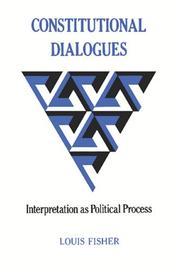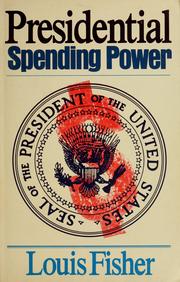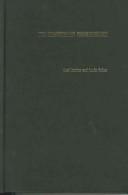| Listing 1 - 5 of 5 |
Sort by
|

ISBN: 1400859573 069160519X 0691022879 9781400859573 9780691077802 0691077800 9780691022871 9780691605197 0691077800 9780691605197 Year: 1988 Publisher: Princeton, N.J. Princeton University Press
Abstract | Keywords | Export | Availability | Bookmark
 Loading...
Loading...Choose an application
- Reference Manager
- EndNote
- RefWorks (Direct export to RefWorks)
Who makes constitutional law? Is constitutional doctrine the monopoly of the courts? In accessible and persuasive prose Louis Fisher explains that constitutional law is not solely or even primarily the Supreme Court's "final word" but rather a richly political convergence of separate interpretations. With a broad range of examples, he argues that constitutional principles emerge from a dialogue among all three branches of government--executive, legislative, and judicial. Important contributions also come from the states and the general public. Fisher identifies executive and legislative initiatives in many areas of constitutional significance. Where there is litigation, the Court generally upholds these initiatives or may avoid making a constitutional decision by using "threshold devices." On those rare occasions when the Supreme Court exercises judicial review and strikes down a presidential or congressional action, it is usually only a matter of time before the proposal is revived and the dialogue begins again.Originally published in 1988.The Princeton Legacy Library uses the latest print-on-demand technology to again make available previously out-of-print books from the distinguished backlist of Princeton University Press. These editions preserve the original texts of these important books while presenting them in durable paperback and hardcover editions. The goal of the Princeton Legacy Library is to vastly increase access to the rich scholarly heritage found in the thousands of books published by Princeton University Press since its founding in 1905.
--Constitution --- --Constitutional law --- Droit constitutionnel --- --Interprétation --- --États-Unis --- Judicial review --- Constitutional law --- LAW / Constitutional. --- Public law. Constitutional law --- United States --- Interprétation --- Constitution --- Constitutional law - United States --- Judicial review - United States --- États-Unis --- United States of America

ISBN: 0691617694 0691644799 0691021732 1400868343 9781400868346 0691075751 9780691075754 9780691021737 1322883394 Year: 1975 Publisher: Princeton, N.J. Princeton University Press
Abstract | Keywords | Export | Availability | Bookmark
 Loading...
Loading...Choose an application
- Reference Manager
- EndNote
- RefWorks (Direct export to RefWorks)
Each year billions of dollars are diverted by the President and his assistants from the purposes for which Congress intended them. Billions more are used in confidential and covert ways, without the knowledge of Congress and the public. Here is the first account of how this money is actually spent.Louis Fisher writes: "When it comes to the administration of the budget, we find nothing that is obvious, very little that is visible. Our priorities here are peculiar. We fix upon the appropriations process, watching with great fascination as Congress goes about its business of making funds available to agencies. What happens after that point -the actual spending of money-rarely commands our attention."To unravel the mystery, Louis Fisher has investigated different forms of discretionary action: the transfer of funds that initially financed the Cambodian incursion; impoundment during the Nixon administration; covert financing; the reprogramming of funds; and unauthorized commitments. He describes each of these devices in operation and provides the historical background of Presidential spending power. In conclusion Louis Fisher presents a cogent and timely analysis of what can be done to improve Congressional control. Sufficient control, he maintains, cannot be achieved merely through the appropriations process, and he makes important recommendations designed to preserve discretionary authority while improving Congressional supervision.Originally published in 1975.The Princeton Legacy Library uses the latest print-on-demand technology to again make available previously out-of-print books from the distinguished backlist of Princeton University Press. These editions preserve the original texts of these important books while presenting them in durable paperback and hardcover editions. The goal of the Princeton Legacy Library is to vastly increase access to the rich scholarly heritage found in the thousands of books published by Princeton University Press since its founding in 1905.
Budget --- Finance, Public --- Specie payments --- United States --- Appropriations and expenditures. --- #SBIB:327.6H10 --- #SBIB:35H6030 --- Diplomatieke, consulaire en internationale openbare functies --- Bestuur en beleid: nationale en regionale studies: Verenigde Staten --- Political systems --- Public expenditure --- Planning (firm) --- Appropriations and expenditures --- Budget - United States --- Finance, Public - United States --- United States - Appropriations and expenditures --- United States of America
Book
ISBN: 0700624686 Year: 2017 Publisher: Lawrence, Kansas : University Press of Kansas,
Abstract | Keywords | Export | Availability | Bookmark
 Loading...
Loading...Choose an application
- Reference Manager
- EndNote
- RefWorks (Direct export to RefWorks)
"Fisher traces the development of the constitutional law of presidential power through federal judicial decisions. He argues that the federal courts since the 1930s have greatly expanded presidential power beyond any fair reading of the original intent of the Framers and the text of the Constitution. Fisher's conclusion is twofold : not only should the courts be held accountable for misleading approaches, biased doctrines, and abdication of function, but so should constitutional law scholars, who have not mined the historical record nor questioned presumptions about executive competence. The result is that both judges and the scholars who comment on their work have legitimized executive power to an extent that has done serious damage not only to the constitutional system, but also to the viability and legitimacy of public policy"-- "In the fourth of the Federalist Papers, published in 1787, John Jay warned of absolute monarchs who "will often make war when their nations are to get nothing by it." More than two centuries later, are single executives making unilateral decisions any more trustworthy? And have the checks on executive power, so critical in the Founders' drafting of the Constitution, held? These are the questions Louis Fisher pursues in this book. By examining the executive actions of American presidents, particularly after World War II, Fisher reveals how the Supreme Court, through errors and abdications, has expanded presidential power in external affairs beyond constitutional boundaries—and damaged the nation's system of checks and balances. Supreme Court Expansion of Presidential Power reviews the judicial record from 1789 to the present day to show how the balance of power has shifted over time. For nearly a century and a half, the Supreme Court did not indicate a preference for which of the two elected branches should dominate in the field of external affairs. But from the mid-thirties a pattern clearly emerges, with the Court regularly supporting independent presidential power in times of "emergency," or issues linked to national security. The damage this has done to democracy and constitutional government is profound, Fisher argues. His evidence extends beyond external affairs to issues of domestic policy, such as impoundment of funds, legislative vetoes, item-veto authority, presidential immunity in the Paula Jones case, recess appointments, and the Obama administration's immigration initiatives. Fisher identifies contemporary biases that have led to an increase in presidential power--including Supreme Court misconceptions and errors, academic failings, and mistaken beliefs about "inherent powers" and "unity of office." Calling to account the forces tasked with protecting our democracy from the undue exercise of power by any single executive, his deeply informed book sounds a compelling alarm. "--
Executive power --- Presidents --- Constitutional law --- History.
Book
ISBN: 1317255003 1315633094 1317254996 161205417X Year: 2014 Publisher: Boulder : Paradigm Publishers,
Abstract | Keywords | Export | Availability | Bookmark
 Loading...
Loading...Choose an application
- Reference Manager
- EndNote
- RefWorks (Direct export to RefWorks)
Judicial process --- Judicial review --- Civil rights --- United States.

ISBN: 1280427833 1423720660 0198038224 1602564795 9781423720669 9781280427831 0195171225 9780195171228 0195171233 9780195171235 0197718906 Year: 2004 Publisher: Oxford New York Oxford University Press
Abstract | Keywords | Export | Availability | Bookmark
 Loading...
Loading...Choose an application
- Reference Manager
- EndNote
- RefWorks (Direct export to RefWorks)
In this fascinating debunking of judicial supremacy, Devins and Fisher argue that nonjudicial contributions to constitutional interpretation make the Constitution more stable, more consistent with constitutional principles, and more protective of individual and minority rights. This highly readable narrative of how the Court and elected officials work in concert with the American people to shape constitutional values is an impressive affirmation of public participation in the political process.
Constitutional law --- Pressure groups --- Judicial process --- United States --- Politics and government. --- Government --- History, Political --- Interpretation and construction --- Politics and government
| Listing 1 - 5 of 5 |
Sort by
|

 Search
Search Feedback
Feedback About UniCat
About UniCat  Help
Help News
News